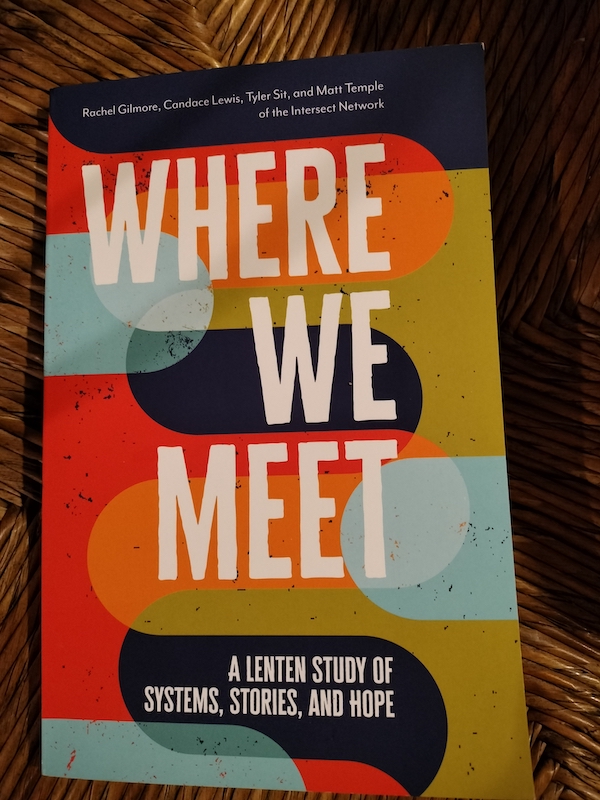
Hi friends,
Who knew that The Upper Room had a progressive side? Maybe you did; I sure didn’t.
So I was delighted when one of their folks reached out and asked if I’d like to take a look at their new Lenten devotional book: Where We Meet: A Lenten Study of Systems, Stories, and Hope.
Because you know I love free stuff.
And because I’m always curious what all is out there. I’m always interested in learning more about who all is out there who might share some of the hopes, critiques, and dreams for church/religion/faith/Christianity that many of us here share.
I’ve had a chance to take a look at some good-sized chunks of Where We Meet, and I like it enough that I wanted to draw your attention to it and put it out there as a Lent resource for anyone who’s looking for that kind of thing. Since, you know, Ash Wednesday is next week (!).
I will admit that I was a little skeptical when I saw that the book was written by a bunch of church planters. Because a church planter is a certain kind of person in my head. But that’s totally not true or fair.
Or, rather, it is totally true and fair—true, that is, of the kind of church planter that dominates a lot of church planting spaces. But that kind of (white, male, upper-middle class, conservative, fraught with unexamined colonialist tendencies, etc.) church planter is not the only kind.
All four of the main co-authors of Where We Meet have had their own experiences of not fitting the typical church planter mold, but have chosen to believe that there is room for them and their own unique identities and callings—and, crucially, they’re choosing to make space to rethink what church planting could look like. I think that’s beautiful. And deeply, deeply needed.
The main authors of this book are all part of a group called Intersect—“a network of church innovators and spiritual entrepreneurs who seek to co-create communities that are postcolonial, equitable, contextual, diverse, and innovative” (p. 7).
That’s cool. And from what I’ve read, I love that their devotional reflections put flesh on what some of these cool-sounding words can look like in actual faith communities.
Personally, as part of a faith community that I think would resonate with most of these values, I find it super encouraging to read reflections from others who are seeking similar things in very different places. My current church is not an out-there, one-of-a-kind, unicorn church. (Sure, we’re unique in our own unique ways, but our vision and values are shared with lots of lots of other people and communities, even if we don’t always talk to each other or even know that each other exist.)
We are not alone in our awesomeness—in all the super cool ways we’re looking to do something different from dominant US white-centered heteropatriarchal Christianity.
And we are not alone in our struggles, which are many, or our messiness, which is very real.
So I love hearing about the experiences of these church planters as they try to build equity, innovation, etc. into their own communities just as we’re hoping to build these values into ours.
I’m also always here, by the way, for a Christian book that’s openly, unabashedly queer-affirming, especially one that features queer folks’ writing. I feel how deeply this is still needed, even in (some) Christian spaces that are trying to be more progressive-ish in other areas like racial justice. You still can’t take it for granted.
So that’s what I have to say about that. If this book sounds like it might resonate with you, consider acquiring it and giving it a read this Lent.
Wishing you hope for postcolonial, equitable, contextual, diverse, and innovative spaces where all can thrive.
Liz